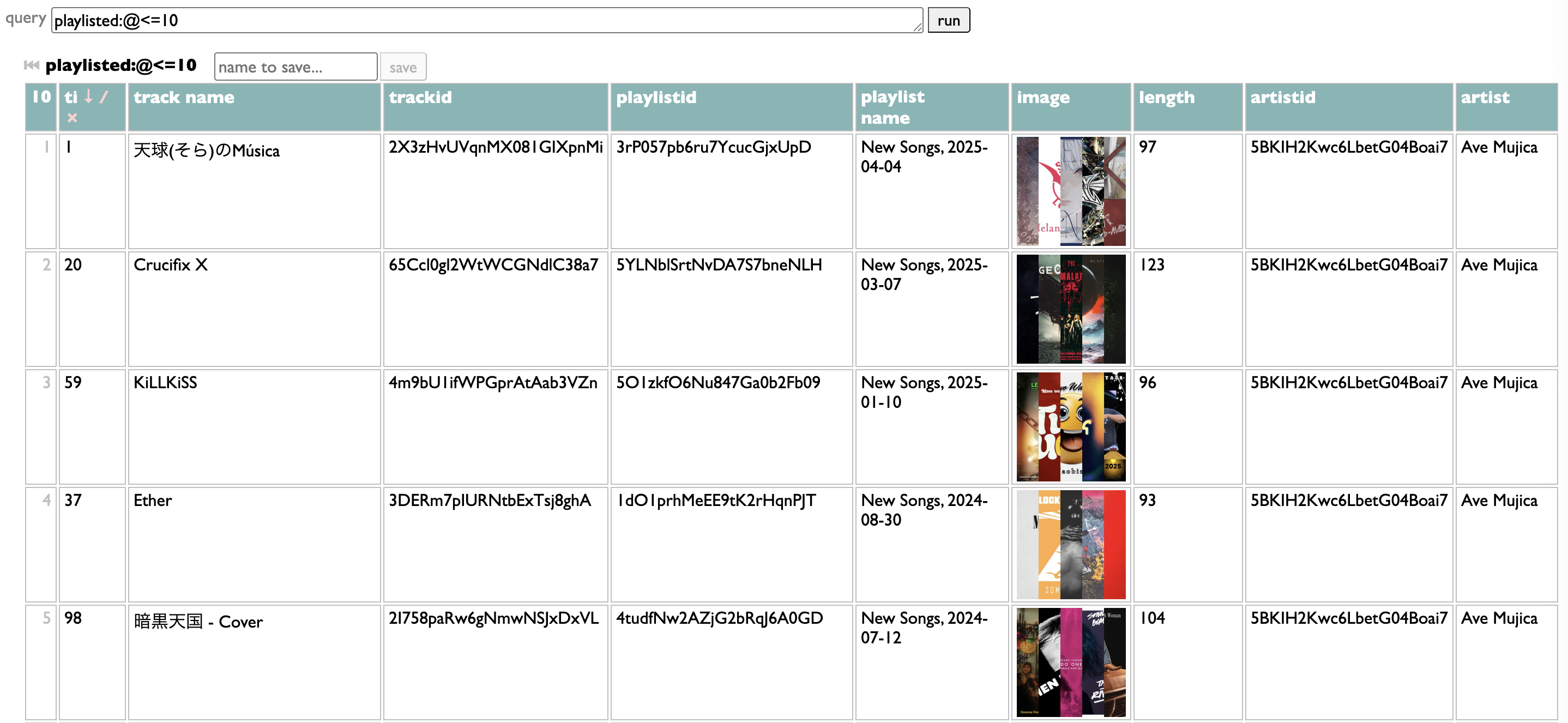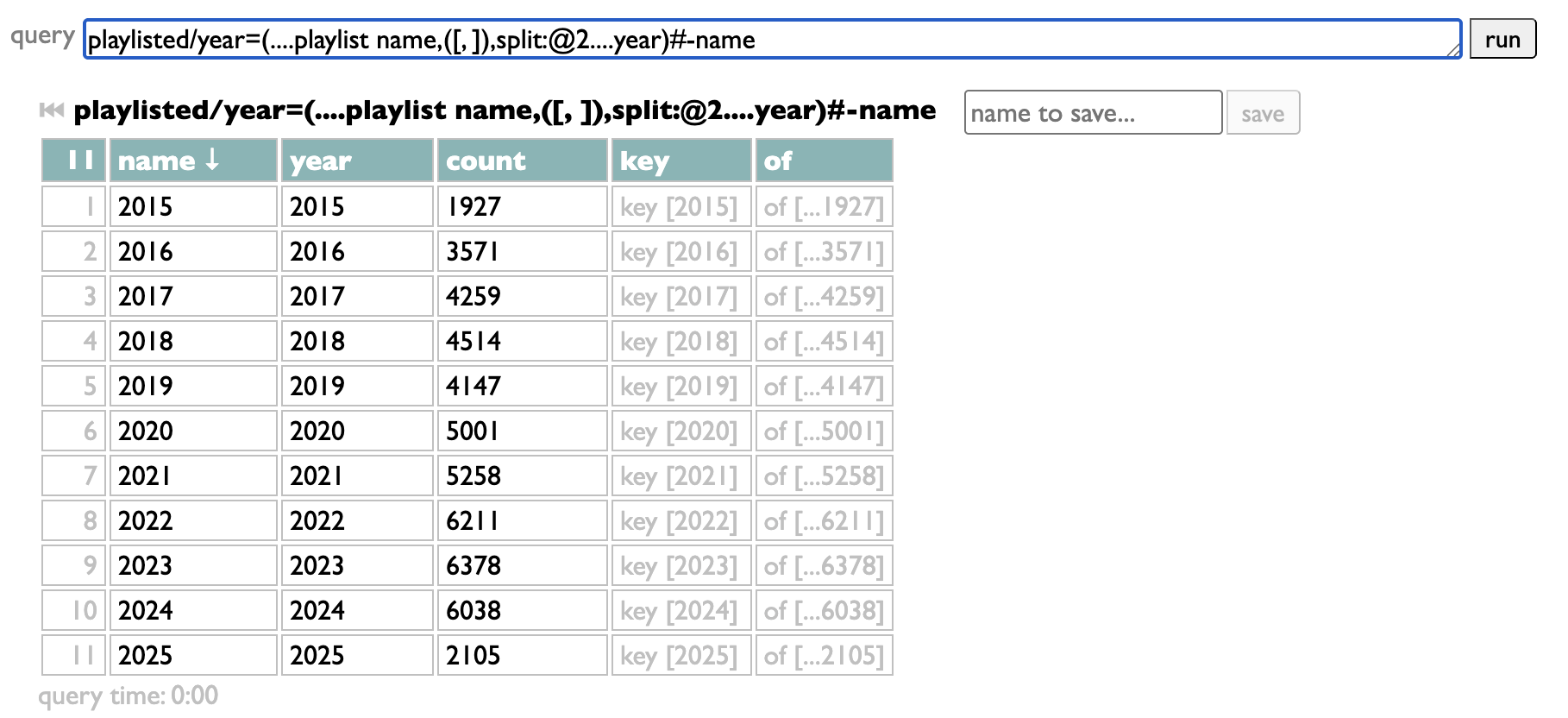¶ Awkward and curious · 17 April 2025 listen/tech
Curio began as experiment in music-curiosity software, but is also increasingly an experiment in how to build personal software in general.
Personally, I organize my listening in weeks, and model those weeks in playlists. Curio has a page for looking at which artists you have put in your playlists, and how often. And because my playlists are dated, it makes sense to me to be able to filter mine by year. But because this may not make the same sense for your playlists, I didn't build a year-filtering feature, I built a filtering feature.
The controls for it are at the bottom of the Playlists page in Curio:

index lets you control which of your playlists are indexed. I make a lot of playlists that are not actually expressions of my own tastes or conduits of my listening, so I've chosen to only index the ones that begin with "New Particles," or "New Songs,". You can put any number of name-prefixes here, ending each one with an asterisk.
filter lets you provide a set of filters in the form of substrings to match against playlist titles. Separate them with commas, and if you start one of the filters with an asterisk, that will give you a magic filter that selects everything, labeled without the asterisk: so "*all" here produces an all-filter labeled "all".

That's kinda flexible, but having to type out the exact filters you want only makes sense if the set is small and doesn't change much, and only doing substring-matching against playlist names is a pretty limited scope.
So the other way you can configure filters is by writing a Dactal query. It has to start with playlisted, which gets you the list of all the tracks from all the indexed playlists.

It has to end with groups of those tracks.

The groups are the filter choices. My query takes the playlist name, splits it at the comma to extract the date, pulls the year out of that date, groups by that year, and sorts the resulting year-groups in numeric order. But as long as your query starts with "playlisted" and ends with groups, in between it can do whatever you want. Once you have it working your way, just copy it into the "filter" box:

The magic "all" filter is added automatically if you're using a query. I should probably add an option to control that, but I haven't yet. This gets us back to:

...except dynamically, now, so I won't have to remember to add 2026 by hand, it will just appear when needed. Assuming, bravely, that neither AI nor fascists have consumed us before then.
If Curio were a commercial application, surely we would never ship a feature anywhere near this awkward and unguarded. But it isn't, and "we" is me, and I'm trying to imagine what the world could be like if your software invited you to be awkward and unguarded instead of pandered to; curious instead of customers.
PS: Also...

Personally, I organize my listening in weeks, and model those weeks in playlists. Curio has a page for looking at which artists you have put in your playlists, and how often. And because my playlists are dated, it makes sense to me to be able to filter mine by year. But because this may not make the same sense for your playlists, I didn't build a year-filtering feature, I built a filtering feature.
The controls for it are at the bottom of the Playlists page in Curio:

index lets you control which of your playlists are indexed. I make a lot of playlists that are not actually expressions of my own tastes or conduits of my listening, so I've chosen to only index the ones that begin with "New Particles," or "New Songs,". You can put any number of name-prefixes here, ending each one with an asterisk.
filter lets you provide a set of filters in the form of substrings to match against playlist titles. Separate them with commas, and if you start one of the filters with an asterisk, that will give you a magic filter that selects everything, labeled without the asterisk: so "*all" here produces an all-filter labeled "all".

That's kinda flexible, but having to type out the exact filters you want only makes sense if the set is small and doesn't change much, and only doing substring-matching against playlist names is a pretty limited scope.
So the other way you can configure filters is by writing a Dactal query. It has to start with playlisted, which gets you the list of all the tracks from all the indexed playlists.

It has to end with groups of those tracks.

The groups are the filter choices. My query takes the playlist name, splits it at the comma to extract the date, pulls the year out of that date, groups by that year, and sorts the resulting year-groups in numeric order. But as long as your query starts with "playlisted" and ends with groups, in between it can do whatever you want. Once you have it working your way, just copy it into the "filter" box:

The magic "all" filter is added automatically if you're using a query. I should probably add an option to control that, but I haven't yet. This gets us back to:

...except dynamically, now, so I won't have to remember to add 2026 by hand, it will just appear when needed. Assuming, bravely, that neither AI nor fascists have consumed us before then.
If Curio were a commercial application, surely we would never ship a feature anywhere near this awkward and unguarded. But it isn't, and "we" is me, and I'm trying to imagine what the world could be like if your software invited you to be awkward and unguarded instead of pandered to; curious instead of customers.
PS: Also...

